Virginia Goes To War Against Uber, Lyft, And Free Enterprise
The Virginia DMV is threatening to crackdown on companies providing innovative car services to consumers.
In a very short period of time Uber, a car service that essentially consists of drivers using their own cars to pick up and deliver customers to requested locations with everything being scheduled via a smartphone app, has become, along with its lesser known competitor Lyft, a sensation. Especially in large cities such as New York, Washington, D.C., and the big cities on the West Coast, it grown virtually overnight into something that, while not nearly as big as most taxi services, is certainly on its way to becoming a major competitor. The main reasons for the success, it seems can be found in a combination of price, convenience, and the fact that Uber’s cars tend to be cleaner, newer, and more comfortable than the typical big city taxicab.
Not surprisingly, the rise of these services has not gone unnoticed by the companies that hold taxi monopolies in various parts of the country or the people who regulate those industries. Taxi unions in American cities such as Washington, New York, and San Francisco have engaged in various forms of protest against the car services and both they and the companies they work for have leaned heavily on regulators to try to stop these new competitors from gaining a foothold. Now that Uber is trying to branch out internationally, even London’s cabbies are getting into the “stop Uber” action. The company is also facing opposition to its efforts to expand the service into France.
The basic argument that’s generally made is that Uber and Lyft are operating unfairly because they don’t have to comply with the same regulations that taxi companies do. Additionally, there have been efforts to over hype isolated reports of Uber drivers engaging criminal activity as an argument against the companies even being allowed to operate. Given the rather obvious threat that companies like Uber pose to the monopoly holders, it’s not surprising that they’d object to the new competition. Indeed, established businesses using their legal influence to try to stop new competition is nothing new.
The latest round in the battle over these upstart car services is being fought in Virginia, where the Department of Motor Vehicles is threatening to go after Uber and Lyft because their companies are allegedly violating the law:
The war between app-based ride-sharing services Uber and Lyft and the state of Virginia is escalating.
Earlier this year, Virginia officials slapped the app-based services with more than$35,000 in civil penalties for operating with out proper permits. On Thursday, Richard D. Holcomb, commissioner of the Virginia Department of Motor Vehicles, sent a cease and desist letter to both companies.
“I am once again making clear that Uber must cease and desist operating in Virginia until it obtains proper authority,” Holcomb said in the letter. (You can see copies of both letters below)
Officials at both companies said they will continue to operate in the state, despite Thursday’s order.
“We’ve reviewed state transportation codes and believe we are following the applicable rules,” Lyft spokeswoman Chelsea Wilson said in an e-mailed statement. “We’ll continue normal operations as we work to make policy progress.
She added that: “Virginia residents have enthusiastically embraced Lyft as an affordable and reliable transportation alternative that increases safety by going above and beyond what is required by existing transportation services. As many of the current regulations surrounding taxis and limos were created before anything like Lyft’s peer-to-peer model was ever imagined, we’re committed to continuing to work with state officials to craft new rules for this new industry. We truly believe that if we approach situations like this positively and collaboratively, we can work together with local leaders to greatly improve transportation access, safety and affordability.”
Even though Holmb noted in his letter that the department has been warning Uber about the state’s rules for more than six months, a spokesperson for the company called the state’s actions, “shocking and unexpected.”
“Uber has been providing Virginians with safe, affordable and reliable transportation options for months and has continued to work in good faith with the DMV to create a regulatory framework for ridesharing,” Taylor Bennett wrote in an emailed response. “We look forward to continuing to work with the Virginia DMV to find a permanent home for ridesharing in the Commonwealth.”
In addition to these statements, Uber is also mobilizing its customers to prompt action out of the Commonwealth, sending an email to every one of its Virginia-based users asking them to contact the DMV and other state authorities about the matter. I received a copy of the email myself. This is a strategy that the company has used in its battles with taxi companies across the nation, and it’s met with some degree of success in that its gotten people to come to meetings that otherwise would have been dominated by taxi drivers and their employers and make the case for these car services from the consumers point of view.
Leaving aside the legal merits of the claims that the Virginia DMV is asserting, it strikes me that the attitude that the Commonwealth is taking with Uber and Lyft is not one that is in the best interests of Virginia residents or consumers due to the manner in which it is essentially designed to limit competition and consumer choice. While there may well be a reasonable case to be made for some regulation of these car services in order to ensure that they are complying with safety requirements and other such matters, this ought to be done in a manner that fosters competition rather than restricting it. Of course, since the Virginia DMV is likely being lobbied by the same entrenched interests as regulators in other parts of the country, it’s not surprising that their actions are designed more to stifle innovation than encourage it.
Here’s the DMV letter to Uber:
And here’s the DMV letter to Lyft :
Photo via The Washington Post
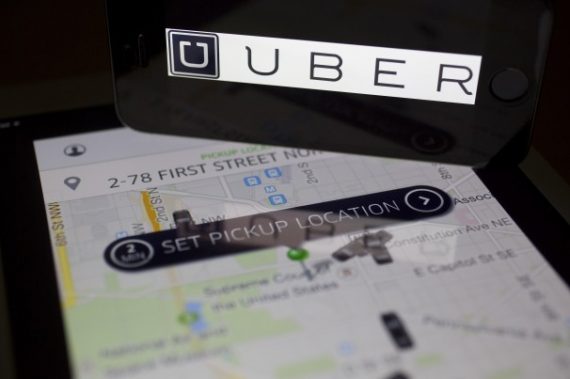

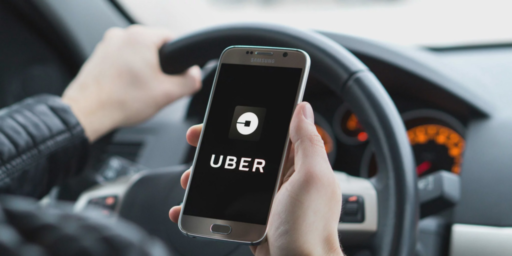
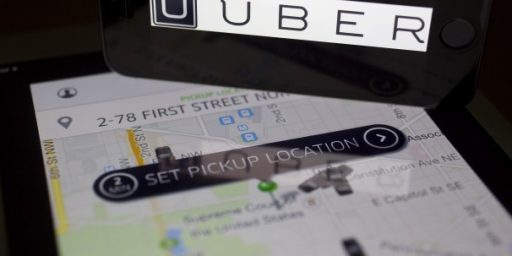
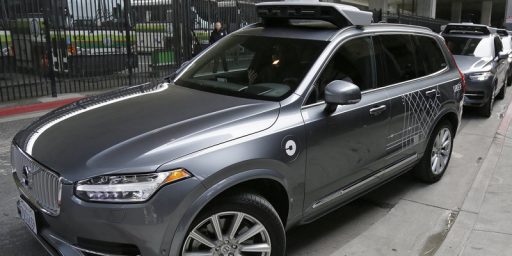
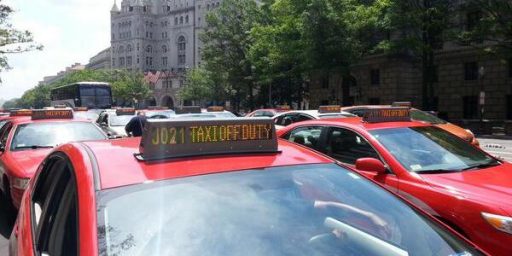
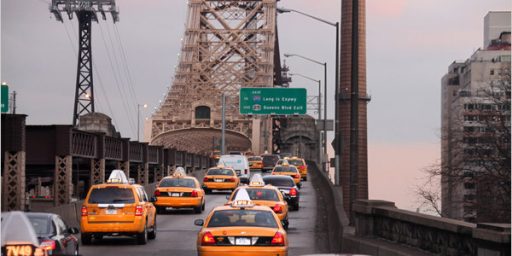
In general, I think the principle in regards to web-based competition to established service industries is whether they use infrastacture their legacy competition is paying for. The classical example is Airbnb, where hotels have to pay taxes and fees to maintain tourist infrastacture, while people who are hosting via the web-site are basically free riders. I don’t think the case applies to Uber, as there is no special infrastacture that cab companies are paying for and Uber doesn’t, so in a perfect world, regulators should thread lightly.
Out here in the SF Bay Area, the biggest problem that people have – as customers, and as business and government officials – has to do with whether or not these people are accountable and insured, should accidents happen. Then too there is the aspect of competition to taxi companies and other private shuttle services – these people pay licensing and regulatory fees while Uber and Lyft are far less regulated, although you can bet that it won’t be long before that changes.
Insurance.
Insurance.
Insurance.
If you drive a car as a “Taxi” or “Livery” vehicle, your regular insurance is null and void. All policies say that. Uber doesn’t make you get additional insurance.
Lyft does.
Buyer beware.
Furthermore, Uber treats each driver as a standalone company. If you read their disclaimers, they’re a foreign based company that basically says “If anything happens to you while you’re in one of our cars, it’s on you, not us. We aren’t responsible for any of it.”
So buyer beware.
I’m going to stick to licensed car services, or better yet, buses and trains.
Never used them before. How do Uber and Lyft work? Does it involve professional drivers (i.e., limo services, town cars etc.) using Uber and Lyft to get clients in off hours? Or is it individuals transporting others in their off time?
@JWH:
Essentially it is a private taxi service.
You place your order using the Uber or Lyft app – where you are, hen you need to be picked up and dropped off, and a rate applies, I’m not sure of the rate methodology.
One of my daughters lives in the city, she doesn’t have a car, and she’s found Uber to be more convenient that trying to catch a taxi from certain parts of the city.
Right, but (and here’s the really, really important thing), what’s the relationship between Uber and its drivers? Between Lyft and Lyft drivers? That is all kinds of important.
Those are all legitimate questions.
However, instead of trying to work with these companies to resolve them, regulators like the DMV and the taxi boards in cities across the nation are doing the bidding of the monopoly holders in trying as much as possible to block the new competitors out of the market.
@Doug Mataconis: UberX and Lyft are trying to force their way into the market by breaking the law. What they are doing is quite simply illegal — commercial drivers without proper insurance, safety inspections and licensing. Basically skipping over all the things that protect the customer.
I don’t see why we should reward people for knowingly and intentionally breaking the law, putting consumers at risk.
(Also, Uber is the traditional, well regulated town car service. UberX is the unlicensed service)
@Gustopher:
Whether they are actually breaking the law or not is for a court to decide, of course.
In any case, even that is true it only goes to further prove the extent to which the state works to protect entrenched interests.
The big problem is the artificial scarcity of cab licenses in most cities. Of course, if you paid a quarter million dollar for a cab license, you’re going to fight for your monopoly. If all you needed to run a cab is a background check, proof of insurance and a certificate of inspection, none of this would happen.
@Doug Mataconis:
Yes, they are. And if the service they were offering was “dental work” or “botox treatments” or “legal services”, you would be fine with that, because of the obvious dangers of having unlicensed amateurs dispensing those services. The only question that is relevant from a public policy perspective is “Is there a legitimate reason why this industry is regulated?”.
Others have pointed out the insurance aspect, which is real. There are other issues as well, which governments in the past have determined have sufficient force to make the obvious disadvantages of a regulated monopoly/cartel be the preferred system. I’m not saying that’s the right decision, but I am saying that it’s not obviously wrong, and you’d need to look at all of the historical factors to figure it out.
Take the London cabs, for example. London cabbies are legendary — the test you have to pass in order to get the license requires extraordinary knowledge of London and its roadways. Because tourism is a huge part of the London economy, the city has a strong interest in making sure that all tourists have a positive London cab experience, and that everyone knows you can get around London easily that way.
Other cities, not so much. NYC has had a long pitched war between the licensed companies on the one hand, and the gypsy cabs and jitneys on the other. That’s because the service offered by the licensed companies and public transit is not, in general, better than the unlicensed. On the other hand, the sheer number of vehicles on the streets is part of the problem, and every gypsy cab or jitney adds another.
I’m all for free enterprise, unless there’s a good reason against it. Nobody wants unregulated gypsy brain surgeons; nobody wants to regulate who can sell keychains and belt buckles. In between those extremes, there’s a lot of territory, and some of it is gray.
It’s not a level playing field though Doug. What do you think of EddieInCA’s point about insurance? I predict that when people start dying the model will die along with them. Now would be a good time for the IPOs…
My son uses Uber. It’s actually very cool because as soon as the car picks him up he emails me a link to a route map and geo-tracking, so I know exactly where he is.
But as Al Ameda says, the insurance issue is troubling, and we may switch.
@Doug Mataconis:
Well, yes….but the “entrenched interests” you’re talking about is a public interested in making sure there are no “commercial drivers without proper insurance, safety inspections and licensing.”
I’m not a big fan of the Dulles (DC area) regulated taxi service but my most accounts the exclusive licensing raised the level of service. Perhaps others can elucidate on the matter but it would appear an instance where licensing is in fact benefitial to most.
@rudderpedals:
Everything looks like a good business opportunity-till the first person dies.
Milton Friedman was great at this. Dismantle FDA and let drug companies just introduce drugs on the market. If someone suffers, the injured person can just sue the drug comany in court, where the plaintiff of course would be in the exact same position as billion dollar corporations with platoons of top legal talent. What could possiby go wrong?
Well, what about thalidomide?
Milton Friedman’s response :
So a child with stubs for limbs can take comfort, I guess, that the manufacturer of thalidomide didn’t profit on the deal.
It was after reading such arguments that I lost interest in libertarianism.
As to the Uber situation, I’m OK with with the regulator’s go slow approach.
So…it’s okay for a company to ignore a ‘stupid’ law, but it’s not okay for the President to ignore a stupid and, quite possibly, unconstitutional law?
@Doug Mataconis:
Uh, Doug, did you actually read the letters the DMV sent out?
In many states the DMV has overstepped its purpose and become a big brother, intruding into peoples private lives and freedoms. One instance is the motor vehicle inspection, which at one time focused on safety, but now tries to entrap people and force them to pay more in costly and unneeded repairs. Lord help the person whose pesky, intrusive “check engine” light is on: the car will not pass inspection. This is usually the result of a false signal, faulty sensor, or loose wire. Very seldom does it involve some pollution problem. Yet the owner will have to fork over money for needless repairs. Even more discouraging is the probability that the dmv will start monitoring mileage, even destinations in further runs on peoples money through fines, fees, or taxes. Many people know how to reset or control the odometer, so that would be one way around that. Older cars are exempt from these inspections. Some states do not even have required car inspections.
My next car will be a 1968 Buick or 1964 Ford Galaxy fastback.
“She’s real fine my 409…my 4 speed, 4 quad, posi-traction 409” (Beach Boys. 1963 Chevy Impala 409:one of the greatest cars ever built).
@Tyrell:
Funny. My every day car is a 1963 customized Ford Fairlane 500 two door sports coupe. Lowered. with a 351 Windsor with an AOD tranny, and a whole new custom interior with modern power seats, custom console, and a custom dash that allows me to run all of my electronics (Sattelite Radio, Navigation, Pandora, Spotify, etc) via an I-Pad mini built right into the car with a Verizon wireless hotspot hard wired into the trunk.
Best part is the minimal money I pay every year to the California DMV because it’s a “classic” car.
@Tyrell: I have no idea what jurisdiction you’re in but a check engine light doesn’t result in a failed inspection in Virginia.
There’s a large segment of the population that doesn’t have smart phones, and cannot afford smart phones, let alone the more expensive non-taxi services. They are locked out of this transit option, which is fine and dandy up until it begins displacing the regular cabs that they can call and/or hail.
Cabs are generally strongly regulated for a reason, and it’s not because of City Hall bending over for the local monopoly. It’s because every time it is deregulated, it becomes a disaster.
@Timothy Watson:
No, but a lit “malfunction indicator light” does — as a friend of mine who lives in Arlington found out yesterday.
@Tyrell:
I’m pretty sure it’s “dual quad”. (Quick Google…) Yep.